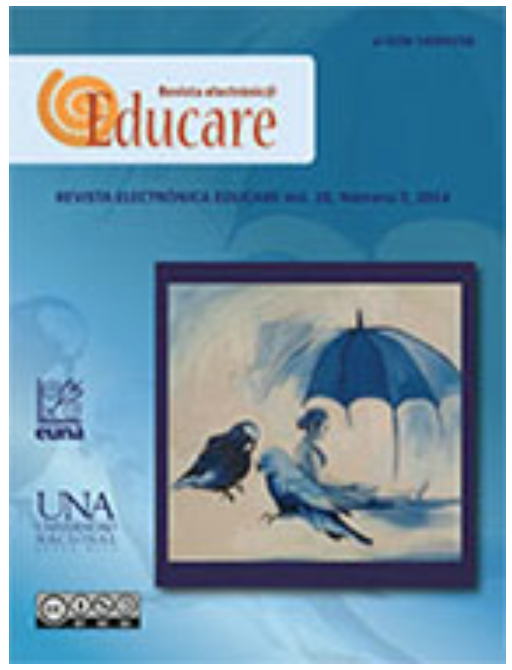Teaching Strategies to Promote Self-Reflection of Pedagogical Praxis in Teacher Training Processes
DOI:
https://doi.org/10.15359/ree.18-2.11Keywords:
Praxis, teaching practices, metacognition, action research, didactic strategies, practical-pedagogical axis.Abstract
As part of a reflection process by the academic staff of the Basic Education Division (DEB) on the conceptualization and implementation of the praxis processes in the DEB student community, the research project entitled “Professional Praxis of Practice Teachers and Senior Teachers” was created in 2013. The main objective of this project is to provide spaces to reflect and/or take action on the practice teaching of the participants involved in the DEB academic programs through action-research processes aimed at strengthening pedagogical praxis. In addition, results obtained are shared by the academic team in order to know the reflections made by the students of the four DEB academic programs during their supervised practice teaching, and to identify the most significant aspects experienced during such practice teaching. A teaching unit was designed to collect and reflect on aspects regarding their practicum experiences in elementary schools. Finally, thanks to the project there was consistency between the theory students receive in classes and the practical-pedagogical axis in the curricula of the DEB academic programs, based on the practice teaching conducted by the student community.
References
Badilla, I., Ramírez A., Rizo, L. y Rojas, K. (2013). La praxis profesional del docente en formación y del formador de formadores (Informe final No. 050918). Universidad Nacional de Costa Rica. Heredia, Costa Rica.
Cabo, C. C. (2006). Pensar y pensarse: Un deber para mejorar la práctica. Revista Iberoamericana de Educación, 39(2), 1-8. Recuperado de http://www.academia.edu/4170740/Pensar_y_pensarse_un_deber
Carrasco, J. B. (2004). Una didáctica para hoy. Cómo enseñar mejor. Madrid: Ediciones Rialp.
Díaz, D. (1999). La didáctica universitaria: Referencia imprescindible para una enseñanza de calidad. Revista Electrónica Interuniversitaria de Formación del Profesorado 2(1), 107-116. Recuperado de http://www.aufop.com/aufop/uploaded_files/articulos/1224326868.pdf
Freire, P. (2005). Pedagogía del oprimido. México: Editores.
Grupo de Tecnologías Educativas. (enero-marzo, 2004). Círculos de acción docente: Fortaleciendo un espacio destinado al desarrollo pedagógico dentro de la escuela. Circunstancias que favorecen la revalorización de este espacio de reflexión. Educere, 8(24), 41-45. Recuperado de https://docs.google.com/a/una.cr/viewer?url=http://www.redalyc.org/pdf/356/35602407.pdf&chrome=true
Latorre, A. (2003). La investigación-acción. Conocer y cambiar la práctica educativa. Barcelona: Graó.
Porlán, R. y Martín, J. (1991). El diario del profesor. Un recurso para la investigación en el aula. Sevilla, España: Dada Editorial.
Míguez, M. (julio-diciembre, 2005). El núcleo de una estrategia didáctica universitaria: Motivación y comprensión. ieRed: Revista Electrónica e la Red de Investigación Educativa, 1(3), 1-11. Recuperado de http://revista.iered.org/v1n3/pdf/mmiguez.pdf
Mondragón, H. (s. f). Prácticas pedagógicas en la universidad para la construcción de ambientes de aprendizaje significativo. Colombia: Universidad Javeriana.
Nail, O., Gajardo, J. y Muñoz, M. (2012). La técnica de análisis de incidentes críticos: Una herramienta para la reflexión sobre prácticas docentes en convivencia escolar. Psicoperspectivas, individuo y sociedad, 11(2), 57-76. Recuperado de http://www.scielo.cl/scielo.php?pid=S0718-69242012000200004&script=sci_abstract
Navarro, R., López, A. y Barroso, P. (1998). El análisis de incidentes críticos en la formación inicial de maestros. Revista Electrónica Interuniversitaria de Formación del Profesorado, 1(1), 1-14. Recuperado de http://aufop.com/aufop/uploaded_files/articulos/1224541140.pdf
Rondón, E., Padrón, E., Salas M. y Chirinos, N. (enero-junio, 2009). Investigación-acción para la deconstrucción de la práctica docente. Impacto Científico, 4(1), 56-71.
Sanjurjo, L. O. (2002). La formación práctica de los docentes. Reflexión y acción en el aula. Rosario, Argentina: Homo Sapiens.
Torre, J. C. (2002). Aprender a pensar y pensar para aprender. Estrategias de aprendizaje. Madrid: Narcea.
Downloads
Published
How to Cite
Issue
Section
License
1. In case the submitted paper is accepted for publication, the author(s) FREELY, COSTLESS, EXCLUSIVELY AND FOR AN INDEFINITE TERM transfer copyrights and patrimonial rights to Universidad Nacional (UNA, Costa Rica). For more details check the Originality Statement and Copyright Transfer Agreement
2. REUTILIZATION RIGHTS: UNA authorizes authors to use, for any purpose (among them selfarchiving or autoarchiving) and to publish in the Internet in any electronic site, the paper´'s final version, both approved and published (post print), as long as it is done with a non commercial purpose, does not generate derivates without previous consentment and recognizes both publisher's name and authorship.
3. The submission and possible publication of the paper in the Educare Electronic Journal is ruled by the Journal’s editorial policies, the institutional rules of Universidad Nacional and the laws of the Republic of Costa Rica. Additionally, any possible difference of opinion or future dispute shall be settled in accordance with the mechanisms of Alternative Dispute Resolution and the Costa Rican Jurisdiction.
4. In all cases, it is understood that the opinions issued are those of the authors and do not necessarily reflect the position and opinion of Educare, CIDE or Universidad Nacional, Costa Rica. It is also understood that, in the exercise of academic freedom, the authors have carried out a rogorous scientific-academic process of research, reflection and argumentation thar lays within the thematic scope of interest of the Journal.
5. The papers published by Educare Electronic Journal use a Creative Commons License:














 The articles published by Educare Electronic Journal can be shared with a Creative Commons License:
The articles published by Educare Electronic Journal can be shared with a Creative Commons License: 



